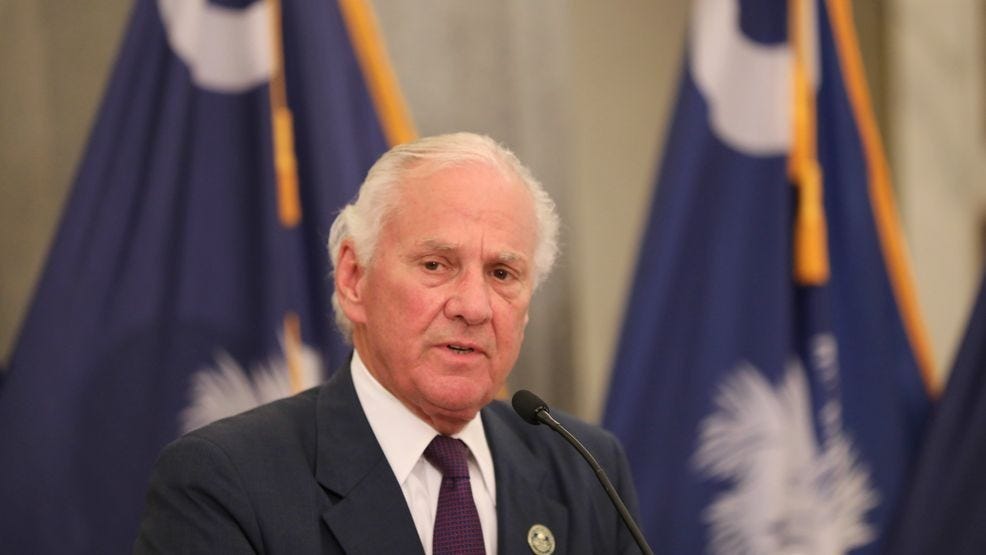McMaster Got it Right
Offshore Drilling or Coastal Commons?

Governor Henry McMaster’s latest call to keep South Carolina under the federal offshore-drilling moratorium feels, at first glance, like a policy footnote and doesn't make huge waves in the mainstream press or water cooler talk. In fact, it points to a deeper question: Who speaks for a coastline that is both economic engine and living community? As a Carolinian who studies integral ecology, I read his letter through scientific and moral lenses while thinking about the fragile futures of Myrtle Beach marshes, Beaufort shrimpers, and my children who comb these shores for shark teeth.
McMaster’s argument is refreshingly concrete and pointed in the right direction. He cites 187 miles of oceanfront and 2,876 miles of tidal shoreline, labeling them “one of the most pristine” stretches in the nation and the bedrock of a twenty-nine-billion-dollar tourism economy. The numbers matter. They remind us that ecosystems are not scenic and passive backdrops but job creators as well, yet they are more than a ledger of GDP. Integral ecology insists that economic value and intrinsic value are inseparable; damage to salt-marsh grasses is also damage to the stories, cultures, and sense of belonging that flourish beside those grasses.
Reuters notes that South Carolina’s coast now supports destinations “like Hilton Head and Myrtle Beach” and that governors McMaster and Josh Stein want the Trump-era drilling moratorium, in place until 2032, fully respected. Their bipartisan stance is politically noteworthy. For years, Charlotte and Charleston chambers of commerce treated fossil leasing as common-sense growth. Today, a Republican governor frames non-drilling as the pro-business position, because spills or seismic testing would endanger everything from charter-boat captains to real-estate values. This shift echoes Thomas Berry’s warning that “the Earth economy is primary, the human economy derivative.” If we ruin the first, we bankrupt the second.
"South Carolina’s coastline is one of the most pristine in the country, and offshore drilling is simply not in its best interest. The state’s 187 miles of ocean coastline and 2,876 miles of tidal shoreline are home to world-renowned beaches, sea islands, and salt marshes—many of which are permanently protected from development," Governor McMaster wrote in his letter to Secretary Burgum. "This unspoiled natural beauty is the foundation of a $29 billion tourism industry supporting millions of annual visitors and tens of thousands of jobs in communities like Myrtle Beach, Charleston, Hilton Head, and Beaufort. These communities rely heavily on the health of our coastal environment. We cannot afford to jeopardize it."
I also hear echoes of John Cobb’s call for community-based economies. Offshore rigs tend to enrich distant shareholders; tourism, fishing, and research labs hire neighbors. The governor’s letter implicitly sides with place-rooted livelihoods over extractive booms that never quite arrive. That choice aligns with integral ecology’s stress on participation: let those who live with the consequences shape the policy.
Critics might argue that blocking Atlantic leases undercuts energy independence or jobs. Yet the official statement itself offers a rejoinder. Coastal industries already employ over 125 thousand Carolinians and inject nine-plus billion dollars into regional GDP. Why gamble those proven gains on wells whose revenues flow elsewhere? Pierre Teilhard de Chardin once said the future hinges on “harnessing the energies of love.” In practical terms, love for place means choosing prosperity that does not cannibalize, colonize, or pollute the commons.
There is also a climate corollary. Every new offshore lease locks in decades of carbon extraction just as heat records topple from Columbia to Cape Fear (especially this week of intense heat). If the Carolinas wish to steer toward renewable microgrids and blue-economy research (as we should), preserving the seafloor from drilling is a first, not final, step. Sean Kelly’s five principles of integral ecology begin with context: understand the whole system before acting. Our coastal context now includes rising seas, intensifying hurricanes such as Helene last September, and the cultural memory of Deepwater Horizon. A moratorium honors that context by allowing us to design truly regenerative economies.
I find myself agreeing with the governor (which is rare in such issues), yet still wanting him to go further. Banning drilling is necessary, but integral ecology invites proactive vision, such as investing in living-shoreline restoration, funding wind-turbine apprenticeships in coastal tech schools, creating marine-conservation corridors managed by local tribal groups, Indigenous communities, and fishers. Such steps would turn a defensive policy into the opening act of what Berry called the Great Work, the transition from human devastation to mutual enhancement.
For now, though, I applaud a rare moment when political pragmatism meets ecological wisdom and thinking beyond GDP, Excel sheets, and "bottom lines" of the short-term capitalist trap. Offshore oil dreams promise short-term royalties; salt-marsh sunrises promise unpayable dividends of beauty, culture, and resilience. Keeping drills out of the Atlantic is not just about avoiding spills. It is about affirming that in the Carolinas, our coast is not a resource deposit but a partner in our collective story. Let us protect it, learn from it, and build an economy that reflects that kinship.


